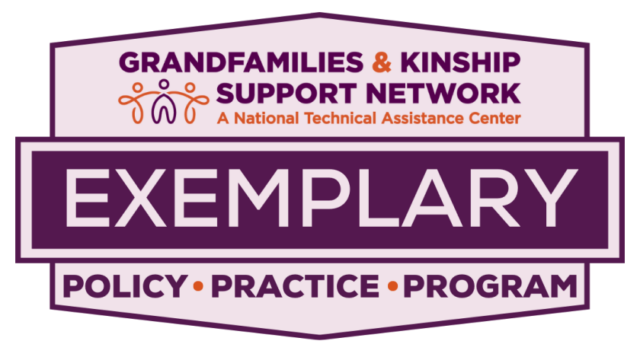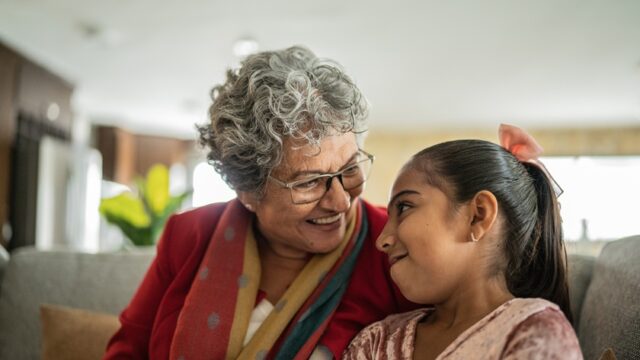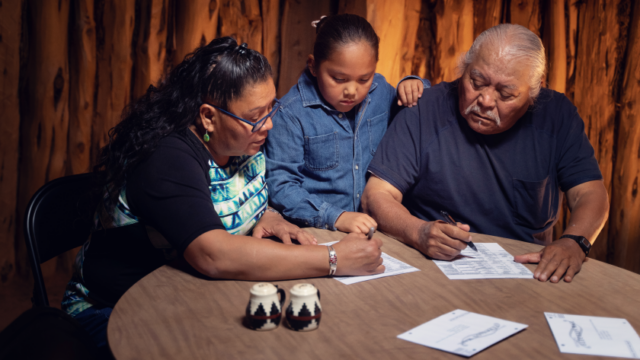Exemplary Programs
Kinship Care Project – Atlanta Legal Aid Society, Inc.
Download This Resource
The Kinship Care Project at Atlanta Legal Aid Society, Inc. provides free legal representation to eligible grandparents and other kin caregivers in the five-county metropolitan Atlanta, Georgia area. The committed legal professionals on staff are focused on helping kin obtain custody of the children in their care. But they do not stop there. At intake, they holistically assess each family’s needs and strengths and can offer wrap-around legal services from other attorneys at Atlanta Legal Aid. Through a formalized cadre of trained volunteer attorneys, the program’s reach is amplified so more kin caregivers can adopt the children in their care and access public benefits. The Grandfamilies & Kinship Support Network is pleased to designate Atlanta Legal Aid’s Kinship Care Project as exemplary.
Since 1990, the Kinship Care Project has offered legal services to grandparents and other kin who are raising children whose parents cannot and who meet income and residency requirements. Most of the families are not formally involved with the child welfare system or courts and come to the project to obtain legal custody or guardianship, or to adopt the children in their care. Originally created in response to the growing number of children impacted by the crack cocaine epidemic, the project has responded over time to the families’ changing needs, including, most recently, the needs created by the COVID-19 pandemic.
The Kinship Care Project’s core components are:
- A holistic intake screening process that assesses the needs of the whole family.
- Free legal representation in adoption, guardianship, and legal custody cases.
- Other civil legal services, depending on each family’s needs.
- An Extended Service Project that ensures that families connect with public benefits.
Eligibility for Services
The Kinship Care Project, located in the Downtown Atlanta office of Atlanta Legal Aid, is open to grandparents, other relatives, and other kin caregivers who reside in one of the five counties the program serves (Clayton, Cobb, DeKalb, Fulton, and Gwinnett) and whose income is at or below 200 percent of the federal poverty level. The project is primarily designed to serve kin caregivers outside of the formal foster care system who need and want a legal relationship with the children they are raising. They work with caregivers of all ages, but the majority are over age 50.
Each of the five counties has an Atlanta Legal Aid neighborhood office and if a caregiver first goes to one of those offices, the caregiver is referred to the Kinship Care Project seamlessly using an online system that communicates directly with the project. The caregiver is not sent to find another office; instead, Atlanta Legal Aid uses a no-wrong-door approach, and the project will follow up with the caregiver.
A paralegal speaks individually with each kin caregiver who meets the basic income and residency eligibility requirements, using a carefully designed script to ask direct, thoughtful questions about the caregiver’s family and their needs. The 30- to 60-minute intake process includes questions about an array of issues that the caregiver and their family may face, such as concerns related to housing or access to public benefits, so that the Kinship Care Project can provide wrap-around legal services beyond the adoption or legal custody case that typically brings the caregiver through the door.
Service Population
The project serves kin caregivers in the five metropolitan Atanta counties. In fiscal year 2022, the Kinship Care Project helped stabilize 2,052 minor children. Caregivers assisted reflected the demographics of the metropolitan Atlanta area.
The project also offers a statewide “careline” for kin caregivers. Caregivers call and leave a message, and a legal professional will return their call within 72 hours and can then provide brief legal advice and services. If the caregiver does not reside in one of the five counties served by the Kinship Care Project, the caregiver is referred to Georgia Legal Services Program (the legal services agency that covers the entire state of Georgia outside of metropolitan Atlanta) for follow-up legal services.
Services
Adoption, Guardianship, & Legal Custody
The focus of the project is to “stabilize the legal relationship between the caregiver and the child through an adoption, guardianship, or custody proceedings.” Project attorneys represent their kin caregiver clients throughout the legal and court processes of obtaining adoption, guardianship, or legal custody.
Each week, Kinship Care Project staff have a case acceptance meeting to review the cases and determine which cases to keep in-house and which to refer to a cadre of volunteer attorneys. Additionally, the staff provide some clients with extended services, such as drafting letters and court documents, and provide self-help resources if representation is not possible. The staff typically give less complex adoption cases to volunteer attorneys to handle, whereas they handle complex, contested adoption and custody cases and/or cases involving a prior client.
Volunteer Attorneys
The project relies on a cadre of volunteer attorneys whom project staff train. Some of the volunteers are retired attorneys. Many others work at the Atlanta office of Kilpatrick Townsend & Stockton LLP. That large law firm has a pro bono legal coordinator who pairs a new attorney with an experienced attorney to handle each adoption case.
The program honors their volunteers each year.
Wrap-Around Legal Services
The project’s stated secondary goal is to “ensure that the caregivers are maximizing all of the resources available to the children in their care.” They accomplish this goal through their intake process when inquiring about housing, public benefits access, and other needs. Using that information, they can refer cases to other Atlanta Legal Aid lawyers who specialize in housing, educational access and special education services, wills, and veteran’s benefits.
Project staff provide caregivers with advice on completing initial applications to obtain Temporary Assistance for Needy Families (TANF) child-only grants, Supplemental Nutrition Assistance Program funds, and other public benefits. Additionally, the Enhanced Services Project (see below) follows up with the caregivers after 30 days to see if they were approved for the benefits. When caregivers have barriers to completing the applications themselves, the project utilizes volunteers from the SIEMENS company to help them complete the applications. Any further challenges with applications are handled by the project’s staff and relayed to the Kinship Navigator program at the Department of Family and Children Services (DFCS) for help.
Enhanced Services Project
The Enhanced Services Project seeks to ensure that all caregivers are able to access the public benefits they need. Volunteer attorneys call clients to follow up and ask whether they have received the public benefits that the project helped them connect with. The volunteers flag any issues that the caregivers may have, work on resolving them, and then refer the caregiver back to the Kinship Care Project for assistance with denials and appeals of public benefit decisions.
Staff
A passionate and caring group of five attorneys and two paralegals at the Kinship Care Project lead this work. Two of the staff have been kin caregivers themselves, including the director, who is raising her grandson. According to the overall project staff, this lived experience gives them all a better understanding of the families served.
One staff attorney is multilingual, and others have a basic knowledge of Spanish. The project also utilizes the other attorneys and paralegals within Atlanta Legal Aid to connect with clients who speak languages other than English. These skills prove very helpful when working with immigrant clients whose English proficiency is limited. Additionally, Atlanta Legal Aid outsources interpreter services via a language line when necessary to meet the needs of the community.

Key Partners
The Georgia Divison of Aging manages a statewide Kinship Care Work Group that meets quarterly to share resources and coordinate work on behalf of kinship families. Atlanta Legal Aid and many of the project partners are part of the Work Group and collaborate closely to refer families to each other.
I think of the Kinship Care Project at Atlanta Legal Aid as part of my team.
Partner Agency Representative
Among the project’s other key partners are:
- Children’s Healthcare of Atlanta – provides Atlanta Legal Aid with office space in three of their area hospitals and refers caregivers to the program.
- City and County School Systems – collaborate to assist program clients with educational issues and make direct referrals to the project for assistance.
- Department of Community Affairs – is providing $1 million per month in direct housing assistance to clients of Atlanta Legal Aid over a roughly two-year period.
- DFCS Kinship Navigator Program – assists in connecting caregivers to TANF child-only and other public benefits.
- Georgia Division of Aging Services – manages the Kinship Care Work Group, among other related tasks.
- Georgia Legal Services Program – handles referrals for legal assistance from kin caregivers outside the five metropolitan Atlanta counties.
- Georgia State Law School, University of Georgia Law School, Emory University Law School, and John Marshall Law School – provide law student interns.
- ISDD (Innovative Solutions for Disadvantage & Disability) – refers caregivers for legal assistance and accepts referrals for the social services that ISDD provides. ISDD has a Memorandum of Understanding (MOU) with the project and most of their caregivers qualify for free legal assistance. Atlanta Legal Aid attorneys also make presentations on legal issues and public benefit changes impacting the families at ISDD caregiver support groups and staff trainings.
- Kilpatrick Townsend & Stockton LLP – provides volunteer attorneys to help kin caregivers adopt the children in their care.
- Project Healthy Grandparents –refers grandparents for legal services and accepts referrals for the supportive services Project Healthy Grandparents provides. The two projects have been partnering for over 15 years and have entered into MOUs as needed to meet funder requirements. Attorneys from Atlanta Legal Aid also present at Project Healthy Grandparents support groups and provide staff training.
- SIEMENS – provides volunteers to help caregivers complete applications for public benefits.
- Together for Families – provides transitional hotel housing for kinship families.
Caregiver Engagement
Caregivers routinely provide input into the project through quarterly surveys in which they are asked about the services they received and if they need more resources. Staff have annual retreats to discuss this feedback and whether to implement changes.
Caregiver clients reported that they feel educated and empowered by the project staff. According to the clients, staff explain the legal process and their options well. This educational piece is critical in good legal service delivery.
If I had a crown to give, I would give it to them.
Caregiver client talking about the staff
Outreach to Families
Most families are connected to the project through direct service providers, such as schools and health care providers.
The Kinship Care Project also staffs tables at school fairs, community festivals, and other events to distribute brochures and project flyers. Attorneys from the project routinely conduct legal presentations to support groups at both ISDD and Project Healthy Grandparents, which have also been a successful way to connect with clients. Additionally, some referrals come through DFCS, either to help caregivers obtain legal custody or to help caregivers avoid having the children placed in formal foster care.
Funding & Sustainability
Atlanta Legal Aid has a diverse and sustainable funding base. The Kinship Care Project operates through annual funding from the Legal Services Corporation, the Administrative Office of Courts of Georgia, and the Criminal Justice Coordinating Council (Victims of Crime Act funds). An individual donor base helps the program thrive, and the cadre of volunteer attorneys who donate their time and expertise extends the program’s reach. Finally, Atlanta Legal Aid receives corporate support from Home Depot and SIEMENS.
Demonstrating Success & Continuous Quality Improvement
The project collects data on all their cases, including results and closure rates. Project staff analyze the data to assess project priorities. For example, they know the counties where a pro se approach (in which clients represent themselves in court) does not work.
Through their weekly team meetings and involvement with the Enhanced Services Project, project staff routinely monitor success and discuss issues and how to resolve them.
The annual retreat provides an opportunity to review the past year and determine action items for the coming year.
Challenges & Areas for Project Improvement and Growth
Universally, partners would like to see additional funding to pay for more staff and to pay for filing fees in court. Project staff also identified the need for more administrative support to do tasks such as finding missing parents and serving notice on parents. Additionally, kinship staff reported that they would value having a social worker to help with the complicated family dynamics that are often involved with these cases. Finally, staff expressed the desire to conduct additional, targeted outreach to the immigrant community and other underserved populations.
Above all else, stakeholders would like to see the poverty threshold raised so more kinship families can be served. The project currently operates with an eligibility requirement that only permits them to assist families with incomes at or below 200 percent of the federal poverty level. While raising the eligibility threshold may not be presently possible given the project’s funding sources, perhaps the program could explore the possibility of developing another cohort of attorneys. The Kinship Care Project could train the cohort of attorneys to assist kin caregivers on a low-cost basis.
Lessons Learned
Project staff emphasized the need to train all staff and stakeholders, including judges, on kinship families and the complicated family dynamics often at play.
Furthermore, project staff advise anyone doing this work to listen closely to the caregivers about their families’ needs, to communicate clearly, and educate them on their options. The caregivers stated their appreciation for this approach during their interview with the Network.
Additional Project Resources
Learn More about the Network’s Exemplary Designation
Network staff, along with a Network subject matter expert, participated in a site visit to this program and are available to answer questions based on this summary. Please complete this short form and we will get back to you.
For information about the steps and criteria of the exemplary designation process, please click here.

